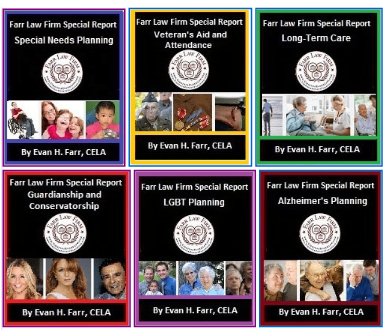Estate Planning for the Modern Family
Published: Fri, 08/07/15
 |
|
Estate Planning for the Modern Family If you cannot view the image below, please read the article on our blog. Q. My family is not what many would consider "ordinary." I am divorced and have been remarried for five years. I have a 40-year-old stepdaughter, a 25-year-old daughter, and a 10-year-old grandson, all of whom reside with us. My mother lives with us, as well, in a large home that I purchased with her, my brother, and his husband
. Any suggestions when it comes to estate planning for my "modern" family? Thanks!
A. The “traditional” family—a married heterosexual couple with children—used to be the most common type of family in America. However, today, only 19% of families are traditional. The rise of blended, same-sex, and multigenerational families has made so-called “modern” families nearly as common as traditional ones.
Even though traditional and modern families share many of the same needs, modern families have their own specific set of challenges. Blended families, for example, struggle with the costs of divorce, raising children from multiple marriages, and potential inheritance conflicts.
Same-sex couples welcome the Supreme Court ruling on gay marriage, but still face distinct estate planning challenges. Couples who support adult children or aging parents worry about funding their own retirement and healthcare needs. The following are some recommendations for "modern families":
Blended Families
Remarriages and blended families present their own challenges when it comes to estate planning. Once you have been through a divorce, you understand that "happily ever after" isn't always the case. Fortunately, estate planning that takes into account your unique family situation can alleviate most of your concerns, allowing you to fully pursue your second (or third, or fourth . . .) chance at love. Below are some tips:
Multi-generational Families
People are living longer than ever before. As a result, more aging parents are moving back in with their adult children for support. At the same time, due to the economic downturn and inability to make ends meet in an entry-level job, more young adults are also moving home after college.
Same Sex Couples
Now that the Supreme Court has legalized same-sex marriage, LGBT married couples must plan for their future and their loved ones. Challenges for same-sex couples relate to the inheritance they could receive, as well as what they intend to pass on.
Estate Planning is Important for ALL Families
We here at The Law Firm of Evan H. Farr, P.C. have strategies in place to help all types of families plan for themselves and their loved ones. With advance planning, each person, regardless of their family situation, can retain the income and assets it has taken a lifetime to accumulate and the peace of mind that their child(ren)’s needs will be adequately and properly addressed. If you or members of you family have not done Incapacity Planning or Estate Planning, or if a loved one is beginning to need more care than you can handle, please contact us as soon as possible to make an appointment for a no-cost consultation:
Fairfax Estate Planning: 703-691-1888
Fredericksburg Estate Planning: 540-479-1435 Rockville Estate Planning: 301-519-8041 DC Estate Planning: 202-587-2797 -------- Critter Corner: I Am Single With No Children. Why Should I Bother Planning?  Dear Commander Bun Bun, I am a free-spirited single person who has never been married or had any children. I don't even have brothers or sisters. Yesterday, my neighbor told me about her estate planning during our morning walk. She suggested I call Evan's office and make an appointment. I disagree. Dying is the last thing I want to think about, and when I do, I don't have many assets or anyone to leave them to. In your opinion, does someone like me need to think about estate planning? Thanks, Salah Toode ---- Dear Salah, A. Even if you are single and/or have no children, asyour neighbor mentioned, estate planning should still be in your plans. Why? Because Estate Planning (including Incapacity Planning) is really about YOU. In fact, there are times when it’s almost more important for single people to do estate planning. After all, when a married person suffers a major illness, it’s usually pretty clear who will take on medical and financial responsibility. For unmarried individuals, the water could be a bit murkier. What would happen if you were to suddenly become incapacitated? Who would make your medical decisions for you? If you haven’t worked with an experienced estate planning attorney, the answer to this question becomes quite complicated. If your parents are still alive, maybe they would be called in to determine how your medical care should proceed. Maybe it would be your next closest family member. Most likely, it would not be your best friend or whomever you would choose. Even if your parent or best friend would be your first choice, that doesn’t mean that the courts would agree without having your express wishes legally documented. And what about your finances? If you are unable to take care of your finances for a period of time, who do you think will do so? The answer to that is: whomever the courts say. Again, it could be a parent, some other relative, or even a court-appointed individual. Finally, what will become of your things if you should unexpectedly pass away? Who would have legal rights to your belongings, to your home, to your pets? You may think you know the answers, but without clearly outlining your wishes with an estate planning attorney, you have very little control over the matter. For a single adult without children, it’s certainly a good idea to look out for yourself. Incapacity Planning Documents that all adults should have in place include an Advance Medical Directive, a Financial Power of Attorney, and a Personal Care Plan (also called. Lifestyle Cate Plan). Estate Planning Documents that most people should have include a Revocable Living Trust & Pour-Over Will. These are crucial in ensuring that your wishes are met and that you have control over your future. An experienced estate planning attorney, such as Mr. Farr, can easily get you on the path to having these affairs in order. Here are other strategies for people living alone:
Hop this is helpful! Commander Bun Bun |
|
||
|
This email was sent to
.
|










